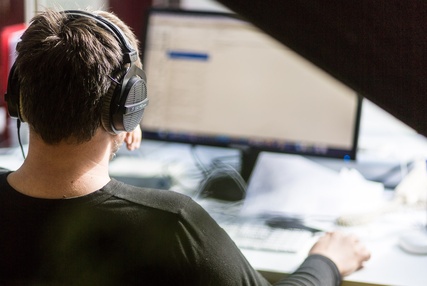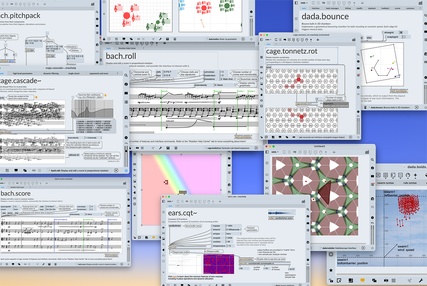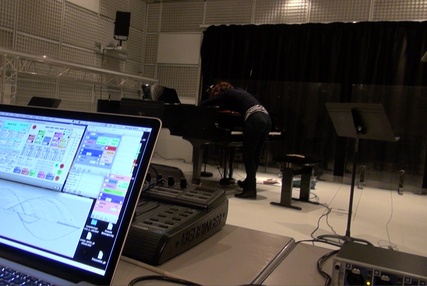jeu 13 novembre 2025,
jeu 20 novembre 2025,
jeu 27 novembre 2025,
jeu 4 décembre 2025,
jeu 11 décembre 2025,
jeu 18 décembre 2025,
14h00- 16h00
Anglais
Initiation
Tarif plein
:
640 €
Mbre Forum Premium
:
450 €
Étudiant.e
:
320 €
OpenMusic est un environnement de programmation graphique destiné à aider le compositeur ou la compositrice dans son travail d’écriture.
![]()
Objectifs pédagogiques
À l’issue de la formation, les stagiaires seront capables d'utiliser un environnement de programmation graphique dans le cadre de leur travail de composition. Familiarisés à l’interface et aux fonctionnalités d’OpenMusic, ils sauront créer des patchs en utilisant la génération algorithmique de séquences musicales affichées dans des éditeurs musicaux. Ils auront également acquis des bases de formalisation musicale et étudié des modèles utilisés dans la musique des XXe et XXIe siècles.
Public concerné
Compositeurs, compositrices, musiciens, musiciennes, enseignants, enseignantes et toute personne s’intéressant à la composition assistée par ordinateur
Prérequis
- Maîtrise de l’anglais à l’écrit et à l’oral (niveau B2 requis).
- Connaissances en solfège, lecture de notes et rythmes.
- Bonne connaissance d’un logiciel de gravure (Finale, Sibelius, Dorico…).
- Connaissances de base en mathématiques : arithmétique, géométrie (triangles, théorèmes de Pythagore et Thalès, symétrie, aires), notion de puissances, équations à une variable, statistiques...
- Maîtrise de l’utilisation des principales fonctionnalités de l'ordinateur Macintosh (connaissance et manipulation du clavier et de la souris, créer et gérer des fichiers et des dossiers, naviguer dans les menus, lancer une application).
- Connaissance de base de l’application Zoom.
Durée de la formation et modalités d’organisation
14h, tous les jeudis de 14h à 16h du 6 novembre au 18 décembre 2025
Formation en ligne, en anglais
10 stagiaires maximum
Programme de la formation
Le contenu du programme est susceptible d’être ajusté en fonction des évolutions du logiciel.
Des exercices à réaliser sont donnés à la fin de chaque séance pour être corrigés collectivement à la séance suivante.
Jeudi 6 novembre : Prise en main
- Découvrir et utiliser l’interface d’OpenMusic (Workspace, Listener et patchs).
- Créer des patchs et manipuler les principaux types de données.
- Configurer les paramètres audio et MIDI. Préférences et synthétiseurs externes.
- Utiliser les éditeurs <note> <chord>, <chord-seq>, génération aléatoire de séquences musicales, transposition.
Jeudi 13 novembre : Rythme (1)
- Explorer les différents types de notation rythmique dans OM : la notation proportionnelle et la notation métrique (<chord>, <chord-seq>, <voice>, <multi-seq>, <poly>).
- Travailler avec la microtonalité dans OM. Exporter au format XML.
- Construire des séquences aléatoires.
- Exercice : générer une esquisse de partition polyphonique (dans un logiciel de gravure) comprenant des accords microtonaux.
Jeudi 20 novembre : le style spectral (1)
- Manipuler le matériau harmonique avec : série harmonique / distorsions / interpolation.
- Utiliser les structures d’itération (1) : <mapcar> et la fonction lambda.
- Construire des spectres et des arpèges.
- Exercice : générer une séquence à partir d’un matériau spectral.
Jeudi 27 novembre : le style spectral (2)
- Étudier les modèles « technomorphes » de la musique spectrale.
- L’itération (2) : introduction à <omloop>.
- Contrôle des processus dynamiques à partir de courbes.
- Exercice : générer une séquence qui fait évoluer un matériau de manière itérative.
Jeudi 4 décembre : Composer avec des modèles acoustiques
- Réaliser des analyses spectrales avec les librairies externes pm2 et supervp.
- Récupérer et traiter les résultats d’analyses spectrales dans une séquence musicale.
- Exercice : générer une séquence basée sur une analyse acoustique (f0, analyse chord-sequence, partial tracking).
Jeudi 11 décembre : Rythme (2)
- Étudier des modèles rythmiques complexes.
- Génération algorithmique de rythmes à partir de règles ou de modèles.
- Exercice : contrôler l’évolution rythmique d’une séquence basée sur une évolution harmonique tirée d’un modèle.
Jeudi 18 décembre
- Travailler l'audio dans OpenMusic. La librairie Sox.
- Exemple de workflow associant audio et symbolique dans OpenMusic.
- Réaliser des séquences audio dans OM.
Exercice final : Compléter un QCM d'évaluation des connaissances (à rendre dans la semaine suivant la formation).
Moyens pédagogiques et techniques
- Cette formation professionnelle se tiendra en ligne.
- Besoins techniques : il est demandé de télécharger OpenMusic en amont de la formation.
- Pour suivre la formation dans les meilleures conditions, il est nécessaire d’utiliser deux écrans et une bonne connexion au réseau internet.
- Format de la formation : la formation est dispensée en anglais. Elle alterne entre des exposés théoriques, l'étude d'exemples à analyser et des travaux pratiques.
- Supports pédagogiques : présentations, un support de cours sera remis au début de la formation et des fichiers complémentaires seront fournis au fur et à mesure.
Suivi
- Session technique le premier jour de la formation pour vérifier l’installation des stagiaires.
- Contrôle du suivi par la signature d’une feuille de présence pour chaque demi-journée.
- Remise d’un certificat de réalisation.
.Évaluation
- Évaluation des acquis sous la forme d’un QCM, à remplir dans la semaine qui suit la formation.





